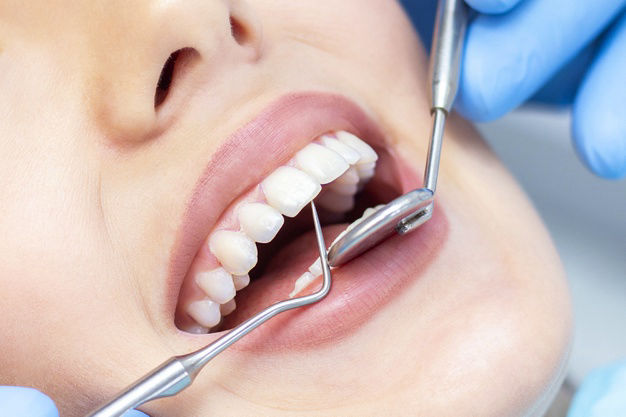Periodontology (Gum Diseases)
It is a branch of dentistry that examines the clinical and microscopic structure of the hard and soft tissues surrounding the teeth, diagnoses diseases affecting these tissues, applies their treatments and maintains the health gained afterwards. Gum disease (Periodontology) is called early gingivitis. Symptoms of gingival disease (Periodontology): bleeding of the gums, red, swollen and sensitive gums, gums that can be easily separated from the teeth, inflammatory discharge between the teeth and gums, swinging and moving teeth, constant bad breath. This stage of gum disease (Periodontology) can be reversible. Sometimes, just better oral care and professional dental cleaning may be enough for the treatment. Depending on the level of gum disease (Periodontology), gingival specialist (periodontologist); In addition to cleaning teeth, curettage and root surface straightening may be recommended. Plaque and tartar are removed from the gum pocket by using special dental tools. Then, the root surfaces are flattened and the gingiva is firmly adhered to the tooth. In cases where this treatment is not sufficient, gingival operations are also on the agenda. Gum diseases (Periodontology) do not heal by itself with treatments such as antibiotics, mouthwashes and vitamins. It must be treated by a gum specialist. Early diagnosis will protect the health of the teeth as well as the gums. If these diseases are not treated, they can result in tooth loss. Since it usually does not progress with any pain, it is still one of the most common causes of tooth loss in our age. In terms of our general health; It is supported by increasing scientific evidence that the size and severity of periodontal disease is an important risk factor. In order to prevent gum disease (Periodontology), correct tooth brushing at least twice a day, use of dental floss at least once, and a regular dentist visit every six months are required.
Bacterial plaque, the common enemy of teeth and gums, is a sticky and colorless layer of microbes that accumulate on the teeth and cause tooth decay and gum disease. Factors such as crooked teeth, caries, poorly made fillings and prostheses, mouth breathing and dry mouth increase the accumulation of microbial dental plaque.
Bacteria plaque combines with the sugar in the food we eat to form a kind of acid, this acid weakens the tooth enamel (the protective hard layer that covers our teeth) over time and causes tooth decay.
The bacterial plaque is soft and can be easily cleaned by the patient, if it is not cleaned and accumulates, it hardens with the effect of calcium and phosphate ions from saliva and tartar occurs. Tartar can only be removed from the tooth surfaces by the dentist. Tartar causes the bacterial plaque that mainly causes gum disease to accumulate on the teeth more easily. Therefore, cleaning tartar is not harmful. Progression of gum disease should be prevented by professional cleaning.
Gum disease (periodontal disease) is an infectious disease that affects the tissues surrounding and supporting the tooth. Periodontal diseases affect all age groups, including children. However, it is much more common in adults. Even teeth that have no decays can be lost due to this disease. Since it is generally painless, its symptoms are hardly noticed by the patient and in most cases, the doctor is consulted late.
Gingivitis
The beginning of gum disease is gingivitis. This disease causes the gums to be red, swollen, and also bleeding while brushing and flossing.
The healthy gum is pink in color, tightly adhered to the tooth and has a sharp end like a knife edge. If the bacterial plaque, which is the main cause of gum disease, is not removed from the teeth, the gum health deteriorates and its color becomes red, the gum becomes slightly swollen, and it loses its ability to hold on to the teeth.
The most important and earliest sign of gum disease is bleeding when brushing and / or biting a hard food. In this case, the thing to do is to apply to a periodontologist.
Periodontitis
Gingivitis heals completely with dentist treatment and good oral care. However, if the disease is not treated, it turns into a more advanced form called "periodontitis" over a long period of time. In this disease, the fibers connecting the root of the tooth to the jawbone dissolve, thus creating a space called "pocket" between the gum and the tooth. More bacteria, bacterial toxins and food residues accumulate in the pocket, so the infection spreads to the deep tissues, and the bone that supports the tooth is melted and the teeth are lost. Researches reveal that periodontal diseases come first with a rate of 60-70% among the causes of tooth loss in the adult population.
Periodontitis may develop without visible symptoms at first. For this reason, regular examination to the dentist is very important for early diagnosis of the disease.
Common symptoms of periodontitis; red, swollen gums, gingival recession / enlargement, gingival bleeding, gingival recession in advanced stages, sensitivity on the exposed root surfaces, decays in the tooth root, inflammation between the teeth and gums, tooth spacing, elongation, rotation, wobbling, abscess formation, bad breath and tooth loss. While initial and moderate periodontitis is treated with non-surgical methods, advanced periodontitis is treated with additional surgical methods.
The effects of periodontal diseases, which are one of the most common health problems in the world, on general body health are well known today. These types of infections not only affect the mouth, but also affect the general health of the individual as bacteria enter the bloodstream. Studies in recent years have shown that individuals with gingivitis have an increased risk of developing some systemic diseases. As a result of these studies, it was determined that gingivitis was associated with diabetes, cardiovascular diseases, atherosclerosis, some respiratory system diseases, low birth weight and preterm birth risk in babies. Therefore, teeth and mouth tissues should be considered as an integral part of the body, and it should not be forgotten that health and disease conditions affect the whole body.
TREATMENT OF DENTAL DISEASES
Periodontal diseases are diseases that can be prevented and controlled to a great extent. The most important stage in periodontal treatment is that the patient learns to maintain oral health by effectively and regularly cleaning the gums, teeth and teeth. In the early period of gum disease, plaque and tartar are removed from the gum pocket by using special dental instruments. In addition to cleaning teeth, curettage and root surface straightening may be recommended. In cases where this treatment is not sufficient, gingival operations are also on the agenda. Gum diseases do not heal on their own, with treatments such as antibiotics, mouthwash, and vitamins. It must be treated by a gum specialist. Early diagnosis will protect the health of the teeth as well as the gums. In the presence of systemic diseases, the medical doctor should be consulted and the disease should be controlled.
During the initial treatment, the removal of local factors that facilitate bacterial attachment, such as the renewal of bad and overflowing fillings, filling of decayed teeth, correction of prostheses that are not compatible with the gum edge and improper shape, canal treatments and if any, desperate teeth should be removed.
After periodontal treatment, patients should be regularly examined by a dentist, plaque control and new tartar deposits should be removed from the environment. But it should not be forgotten that; No procedure can be more beneficial than the effective application of daily oral care procedures for the maintenance of what has been achieved with periodontal treatment.
For the treatment or control of periodontal diseases, mechanical and surgical periodontal treatments are usually sufficient together with effective plaque control. However, periodontal destruction continues in some cases despite ideal care. In these cases that do not respond to traditional treatments, a positive response is obtained with antibiotic treatment in addition to traditional treatments. In addition, for preventive purposes after surgical treatment and against the risk of spreading of microorganisms in the mouth through blood during periodontal treatment; Antibiotics can be used for protective purposes in patients with uncontrolled diabetes, endocarditis, organ transplantation, coronary bypass, heart valve replacement and other risk groups. However, antibiotics are not required in the vast majority of cases of gingivitis and periodontitis. Unnecessary and improper use of systemic antibiotics causes serious bacterial resistance and poses a danger to the individual and society.

